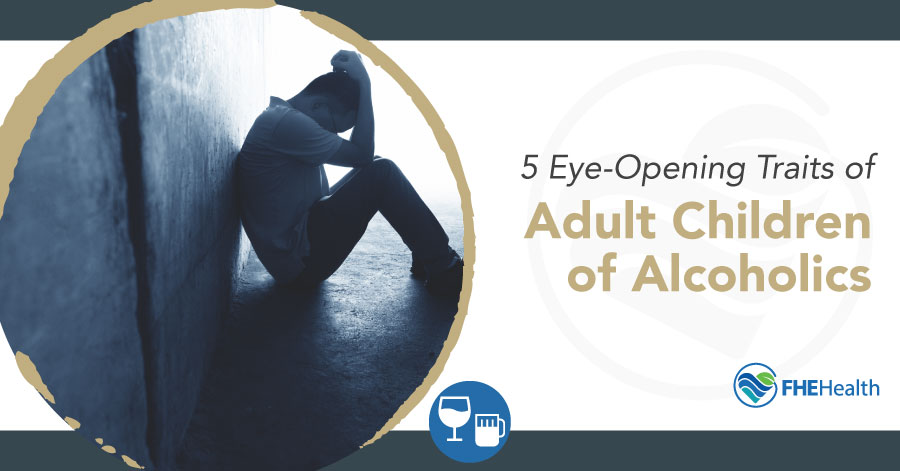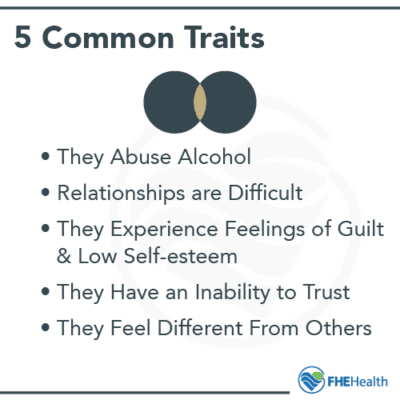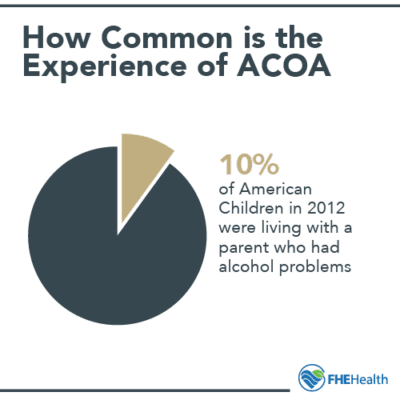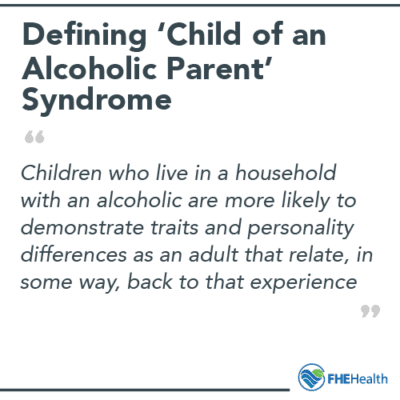
Did you grow up in a home with an alcoholic?
You may have faced days of stepping on eggshells and avoiding that parent because you knew that it only took a very little problem to create a scary situation. You may have experienced being made fun of at school, or you had to work to hide the evidence of a parent’s use so your friends never knew about it. People in this situation are known as adult children of alcoholics, or ACOA.
Adult Children of Alcoholics is also a nonprofit organization that supports adults who grew up in this challenging environment. But even outside of this formal group, many adults face the complications and consequences of growing up in a home where alcoholism was very much the norm.
What Does the ACOA Organization Do?
The ACOA provides information and support for adult children of parents with alcohol use disorders. The organization provides a safe and nonjudgmental atmosphere where people can meet and discuss their childhood, grieve for their past experiences, and evaluate their own lives in the context of healing. There are many chapters of the group, and these meet all over the country. Individual members hail from all walks of life, because alcoholism is a disease that does not discriminate, affecting families of every income level, religion, or ethnicity.
The goal of the ACOA, of course, is to promote healing and recovery. As many children of alcoholics know, there isn’t necessarily a cure for the traumatic experiences they faced when they were young, vulnerable, and immensely impressionable. However, people who have suffered traumas can go on to learn how to cope in healthy ways. ACOA helps people assess their own behaviors in order to change them for the better. Talking, listening, sharing—the individuals in each group assist each other, helping one another grow and develop strategies for becoming psychologically healthy adults in control of their own wellbeing.
Understanding the Not-Uncommon Experience That Children of Alcoholics Face
Alcoholism is common in the United States. A SAMHSA study found that 10 percent of American children in 2012 were living with a parent with an alcohol problem. According to a statistic from Cornell University, there are 28.6 million children of alcoholics living in the United States right now, and 6.6 million of them are under the age of 18.
Children of alcoholics are at a higher risk of drug and alcohol abuse. In some cases, the alcoholic parent may have been the only adult in the home. In other cases, one parent may have been an alcoholic while the other was codependent and experiencing their own brand of trauma. Consequently, children see two types of adults, neither of whom cope with life in healthy ways.
While the specific nature of each person’s childhood experience may differ, the same overall sense of trauma and dysfunction is a unifying feature of the experience of ACOA. These survivors experience a level of chaos that many others do not. But for ACOA, chaos is a way of life. Their parent may lose their job, leaving the family in financial distress. The parent may exhibit abusive behaviors when drinking or when unable to drink. Growing up with this chaos can often entail the internalizing of anxiety to the point that feeling anxious is simply a baseline for living—it’s that individual’s “normal.” (But, naturally, it is not normal, and it can lead to lifelong problems if left unaddressed.)
The Trauma of ACOA
A number of unifying traits tend to describe ACOA. These personality characteristics occur as a result of growing up in a chaotic environment. Understanding ACOA traits is important for those who have lived with an alcoholic because it can help them understand why they feel and act the way they do. In many situations, kids of alcoholics have faced a unique set of traumatic events that’s hard to equate with any other type of trauma.
What Is “Child of Alcoholic Parent” Syndrome?
A person who grew up in this type of environment may have what is formally called “child of alcoholic parent syndrome.” What we know now is that children who live in a household with an alcoholic are more likely to demonstrate personality traits and differences as an adult that relate, in some way, back to that experience.
The “child of alcoholic parent” syndrome describes that feeling. Though it would be beneficial to be able to leave the past in the past, that’s not usually how it works. Rather, people with this syndrome feel a rush of emotion and feelings of anger, frustration, fear, and anxiety as they remember the past. Often, people suppress these emotions and lock them away. Then, suddenly and often without warning, they remember the way they felt, and these feelings can manifest in all sorts of different ways, sometimes negatively.
The experience is much like post-traumatic stress syndrome. For example, when a person goes to war and watches, hears, and experiences sounds of gun violence, they often react to car backfires and fireworks with the same emotions they felt while at war. Something similar happens to kids of alcoholics. An angry spouse, for example, can bring up those feelings of being a helpless child in a very scary situation, creating conflict and intense emotions that may be out of sync with the reality of the current moment.
What’s more, many people don’t know about ACOA. As a result, they may display symptoms of the condition, and no one around them can connect their past experience with their current behavior. This makes diagnosis and treatment very difficult.
5 Common Traits of Adult Children of Alcoholics
The traits of children of alcoholics can range, and no specific set of symptoms or signs are always present. The following are some of the most common that a person with “child of alcoholic parent” syndrome may experience.
1. They Struggle with Alcohol
Many of those who grew up in this environment struggle with alcohol abuse themselves. Studies indicate that adults who are alcoholics now are likely to have had a mother, father, sibling, or, in some cases, a close family relative who was an alcoholic.
In some situations, individuals follow the same path of their parent, drinking as a part of everyday life. Others recognize this behavior as negative and vow never to drink alcohol at all. In either case, they have very powerful opinions and beliefs about alcohol’s role in daily life. Their extreme reactions to alcohol stem from what they experienced as children.
2. Relationships Are Difficult
Many ACOA struggle with relationships. This stems from their difficulties with their alcoholic loved one growing up. For example, fathers may find it difficult to interact with children if they didn’t have that unique bond with their own father. Women may find it hard to cope with emotions because their own mothers drowned their emotions by drinking.
ACOA often grew up without good role models. In fact, the adults in their lives may have been exceptionally poor role models who were, themselves, unable to maintain healthy relationships with others. The children develop with a skewed sense of normalcy. They get used to aspects of bad relationships as learned from their parents. They don’t learn what is essential for a healthy relationship often until they are much older.
3. They Feel Guilt and Low Self-Esteem

It’s not uncommon for adult children of alcoholics to exhibit intense feelings of guilt for their current actions and the way they’re raising their own family. Many times, they have low self-esteem brought on by the experiences they had with their parent growing up. This can manifest in more complex problems. In some people, it can develop into clinical depression, especially if there’s a predisposition within the family.
There may also be a profound sense that they will grow up to be failures. Many children, because of the life experiences they had growing up, feel they will never become anything of value or worth. This can make it hard for a person, especially a young adult, to ever see themselves as successful.
4. They Have an Inability to Trust
ACOA grow up learning not to trust people. This often occurs because they couldn’t trust their parent to help them, to be there, or even to just remain sober. This inability to trust is a key reason why relationships for kids of alcoholics tend to be difficult at best. Often, this inability to trust can lead to marital problems and work-related concerns. It’s easy to be convinced that someone is cheating on you, for example, if that is something you saw happening as a child.
They grew up and developed in a home where they could not trust one or even both of their parents. They could not trust their parents’ judgment or behaviors—and the outcome of those behaviors often left them hurt and traumatized.
So, how do they put aside that natural feeling of mistrust to build a loving and trusting relationship as adults? It’s not easy, because they may also feel insecure or unable to communicate why they feel the way they do. Worst of all, they may feel unable to change the way they feel and live. That’s where organizations like ACOA and private counseling can be so helpful.
5. They Feel Different From Others
Being a child of an alcoholic can create situations where you don’t feel “normal” or like everyone else. This may be because a child can grow up feeling like their family was weird or bad, and that feeling carries on into adulthood. They may feel like no one takes them seriously, that people are pointing and laughing at them, or that others are talking about them behind their backs. If they’re not aware of how many other people do grow up in dysfunctional homes, they can end up feeling even more isolated.
Help for ACOA
Adversity is part of life, and, yes, adult children of alcoholics often appear to have far more than their fair share. But today and tomorrow can be made better. ACOA do not have to feel isolated or fearful about how to relate or feel in the
context of their past and even present traumas. Therapy and group support can lead to positive lasting change. Experiencing fellowship with others who share similar experiences can make the past seem less dark or, at the very least, make the future appear brighter.
The trauma experienced by ACOA is both very real and very treatable. A licensed and compassionate counselor and the help of an ACOA support group can often be the bridge to overcoming ACOA syndrome and making peace with the past. For more information, call us today at (888) 665-8914. At FHE Health, our priority is helping individuals and families heal from childhood wounds and the legacy of alcohol abuse.








